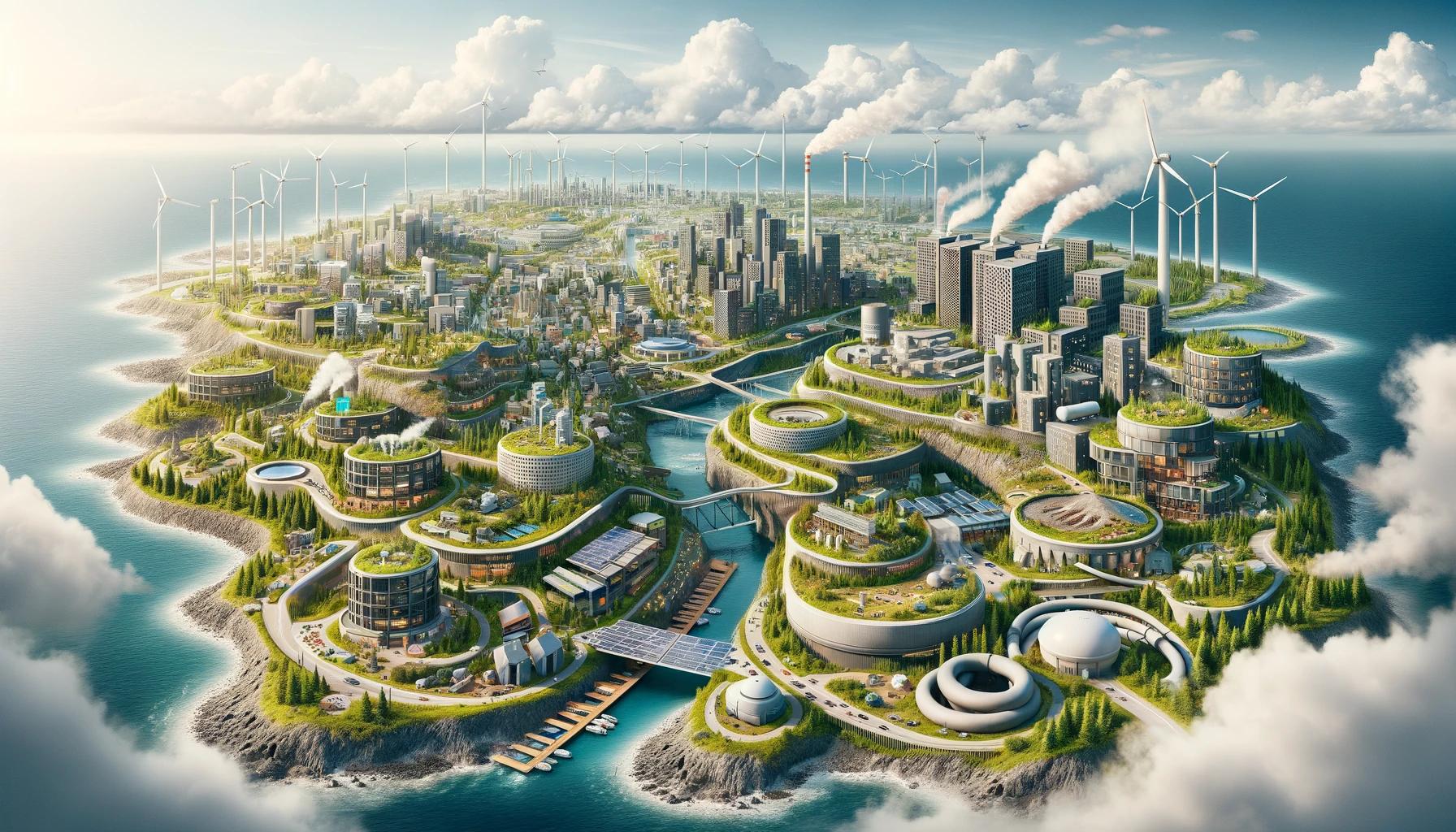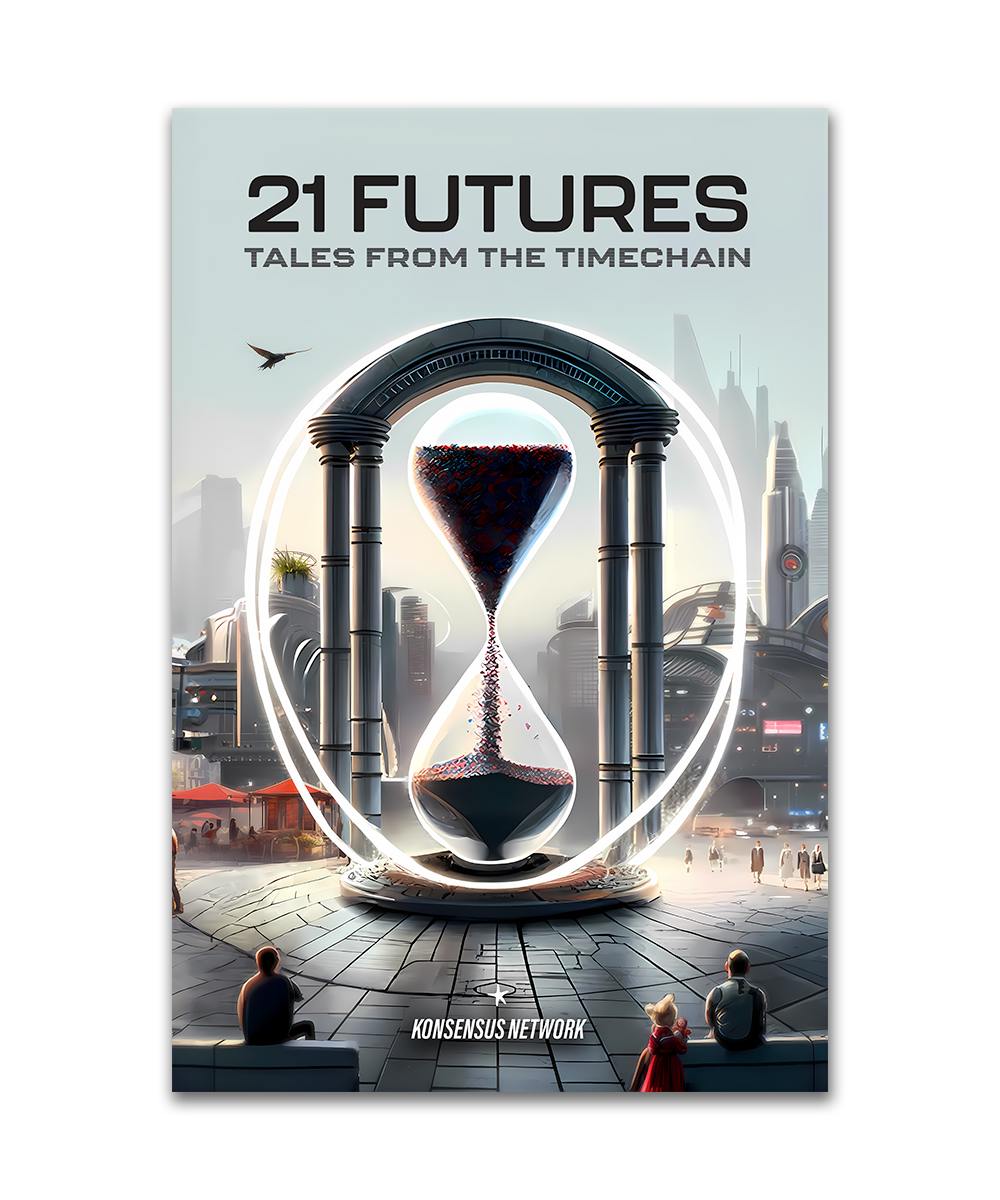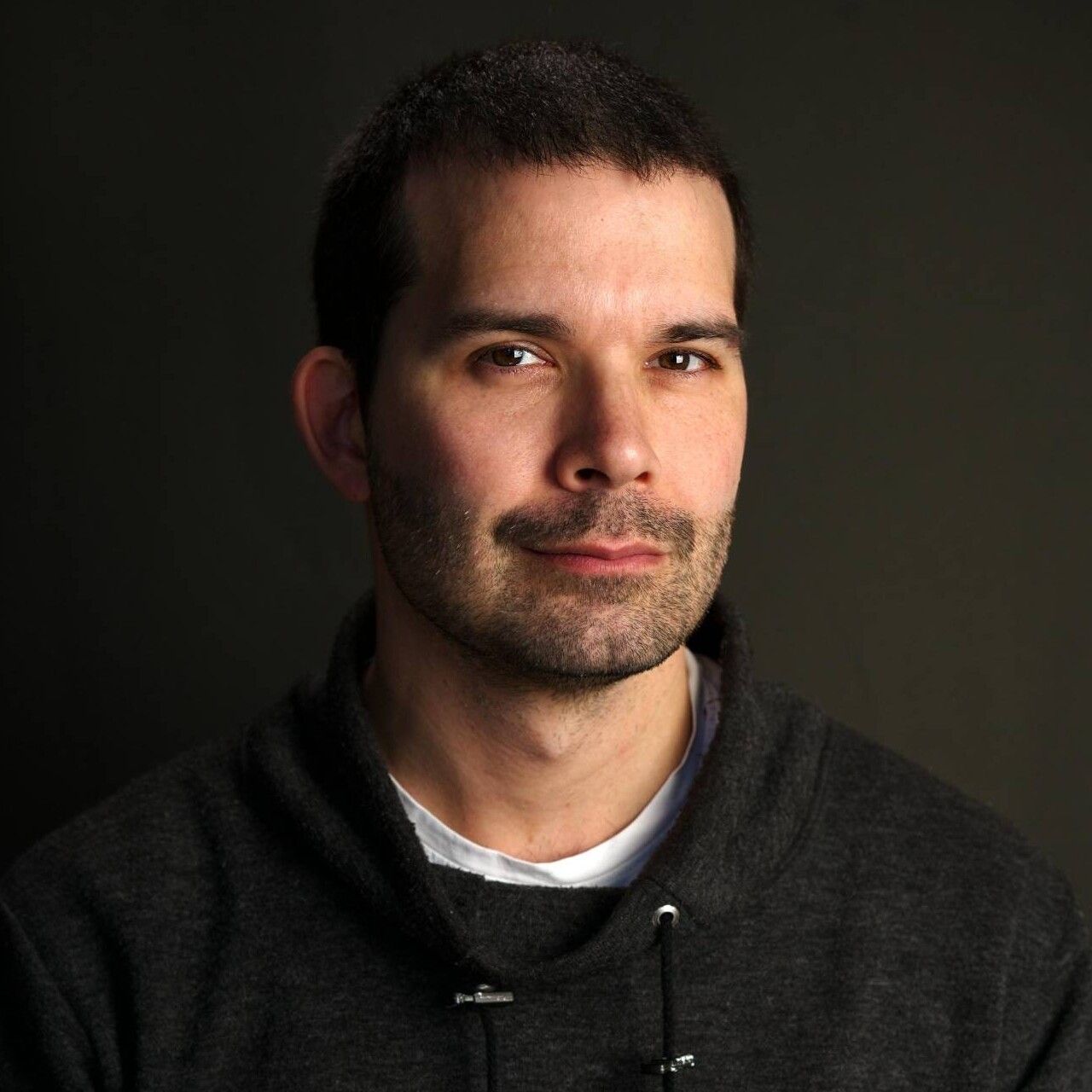
A matter of survival
One early December morning, Dad came home with a triumphant grin on his face, and without giving the horror time to subside, he announced: “Get your affairs in order, girls! This fall we’re moving to Sabina!” SA-toshi BI-tcoin NA-kamoto. A stupid acronym for a stupid city. Also known as The Free Island, Free City, or Orange Town.
I came to the Free Island during the fall of 2045. Dad was giddy with anticipation and totally oblivious to the dour mood on deck. He gestured wildly, deafening in his efforts to infect us with childish joy. To our right stretched several long rows of containers. Their dull, square appearance seemed almost natural in the flat waters, with green-painted steel ramps stretching between them. The collective humming of the miners was hard to miss but not as bad as I’d feared. In the distance I could see what appeared to be a construction crew, carrying wires and pipes around in the manner of people who have more work to do than can ever be completed in a lifetime, yet I could hear shouting and laughter above the general din. Unlike my father, this place seemed to be normal.
I walked to the stern of our ship, a slick cruiser used to ferry people to and from Gran Canaria, and spotted the main docks up ahead. They were big, yet obviously not built for this sort of influx. There must have been several hundred boats there, their supplies hurriedly offloaded to waiting trolleys as tourists and prospective citizens made landfall. At one end of the quay, there was a barred gate leading to a set of stairs and a tall walkway, perpendicular to the rows of miners. Service crews could get to the city’s precious infrastructure without getting their feet wet, but it didn’t seem secure. Locked doors and guards would stop impulsive amateurs, but trained agents?
At the other end of the docks, there was a narrow building overlooking a broad and friendly-looking walkway. A big, orange sign said “Immigration and customs” in an overtly flagrant typeset, and the three floors worth of offices struggled to cast a shadow on a spectacular neon conflagration across the street that seemed to be a combined bar, souvenir shop, and zoo. My father was still speaking frantically, and I watched as a drop of spittle landed on my mom’s hat. During the flight, she had stopped listening to him, as it became apparent that he was barely mentally present. Instead, she chose to focus on drinking, turning to the task with determination. This was much better than the months before our departure from Boston, when she clung to the hope that there was some way to talk him out of it. Resigned to her fate, she took her pleasures where she could find them, which at the moment consisted of a sixth glass of Cava.
My parents had met online back in 2025, when they were both in their mid-thirties and desperate for a final shot at normalcy. Dad could offer a steady income with good prospects for advancement, and high status, which had sufficed to earn my mother’s respect and love. In return, she could offer him sex and children, and it’s anyone’s guess why Dad saw this as a good deal. At the time, he was completing a Ph.D. in molecular biology at MIT, working on something to do with the immune system of rats, and as far as I understand he was seen as a future star of the field. Their marriage led to a single child - me - and a lot of shattered dreams. After getting his Ph.D. my father got a position as an assistant professor at M.I.T., which he managed to keep for two and a half years. He had always found rules annoying, but after the second year, he became infuriated by every obstacle to what he called his “plan”. Dad has the soul of a true tinkerer – or a child – and he wanted to explore every nook and cranny of nature’s operating system. Given free reign, he would have left a trail of chimeras, each discarded as a broken toy when the next flash of inspiration struck him.
In the end, Dad went rogue. When a group of drunk freshmen had gone exploring the basements, they had heard strange noises from the old central heater. Behind a decommissioned oil furnace, tucked away in an alcove, they were horrified to find “Rattus Sapiens”, Dad’s pride and joy. I’ve since learned that he wasn’t the first person to get the idea of making rats more intelligent with gene splicing, nor was he the first person to try it out. But where other researchers would have gone about such experiments with extreme caution, Dad was a firm believer in the method of trial and error. He was proud of his human rats not because they were clever or healthy, but because they were able to stay alive at all.
A lid was slammed on the whole affair, and dad narrowly avoided charges by promising to keep his mouth shut. He still lost his job and was forced to accept some measure of oversight. After digging around for a bit I managed to track down a picture of the rats. Behind three, orange-sized human faces, with necks that were stretched to bleeding rags, lay three useless rat bodies. Their sharp-featured faces had beady eyes, a jumble of oversized teeth, and disturbingly human expressions that, somehow, spanned the extremes of joy and agony. Most disturbing of all was dad’s face, barely visible in the background, looking happier than I’d ever seen him.
Dad had a sizeable inheritance that kept us afloat financially, and, of course, he kept experimenting. He set up a lab in the garage and was busier than ever. Mom’s hope for normalcy had withered away, but the prospects of a divorce carried risks that were unacceptable to her. With no claims on dad’s inheritance, she would have had to earn a living herself, and her drinking habits would hurt her chances of securing custody. The prospect of work was likely sufficient to keep her from leaving. Even though Dad never got caught doing anything illegal, regulatory authorities would arbitrarily confiscate some of his precious equipment. This forced him to gradually move off-grid, both in real life and online. His presence during my childhood was sporadic, intense, and unanticipated. The only thing more terrifying than his regular displays of obsessive fury were the rare occasions when he’d show up in high spirits, bidding us farewell with happy assurances. Mom would drink until she passed out then, and I’d lie sleepless in my bed, thinking of Rattus Sapiens and hearing the echoes of dad’s carefree humming.
One early December morning, Dad came home with a triumphant grin on his face, and without giving the horror time to subside, he announced: “Get your affairs in order, girls! This fall we’re moving to Sabina!” SA-toshi BI-tcoin NA-kamoto. A stupid acronym for a stupid city. Also known as The Free Island, Free City, or Orange Town – the place has many names, and for every passing year, it has been subject to increasing amounts of hype and scrutiny. With their unbreakable network and mining rigs, anarchists found a way to exploit an untapped source of almost unlimited geothermal energy, outside of every jurisdiction.
As profits were reinvested, attracting a growing stream of funds and talent, what had started out as a curious experiment grew into a self-sustaining metropolis in the middle of the ocean. Meanwhile, governments around the world grew stale as they continued their slow slide into authoritarian bureaucracy, in envy of the vibrancy of The Free City. Almost from the very beginning, there had been calls to seize or control the island. Environmentalists didn’t want humans out here and claimed that the heat and noise of the mining facilities were causing great harm to animals. As the population kept growing, commentators asked if and when this free state would join the international community and ratify the UN charter, and its lack of enthusiasm for such formalities led to harsh denouncements. In regular media channels, Sabina was presented as a haven for criminals, where the weak were left to fend for themselves while the strong and well-connected could live as kings. Now it literally had a king.
But as I looked across that prow, my gaze on the spectacle beyond the docks, I can’t deny that my heart was racing with excitement.
On land, cities will stick to the landscape, like a tight film of concrete and steel. But Sabina followed a different logic. Building, transporting, securing, and anchoring the enormous steel platforms that formed the city’s ground level was expensive and time-consuming, while building stuff on top of them was quick, cheap, and safe. However, as the stream of immigrants, tourists and fugitives turned into a rush, the rate of horizontal expansion had accelerated.
The result was a sprawl of hectic industrial activity on the peripheries, surrounding what probably counted as suburbs here; structures rising 30 or 40 stories into the humid air, connected by bridges and electrical wires, and absolutely plastered by neon lights marking bars or arcades, artwork depicting historic scenes or futuristic landscapes, billboards promoting events or products, and giant screens showing news or sports. A thousand drones were zipping along on tight, invisible pathways, and I caught a glimpse of a jet suit speeding between two buildings. Sat in the middle of it, like a bowling ball on a plate of fries, lay The Core.
From a distance, it had seemed to be one big structure, but as we pulled into the wharf I could clearly see the individual skyscrapers, tall white blades that seemed to defy gravity, and even common sense. I held up my finger, palm forward, and closed one eye, barely able to cover the breadth of the closest spire. The first building was started back in the early 30s, but rapid growth in population, technology and financing capabilities had caused construction to speed up massively. By outbidding any contractor and attracting the best and brightest from all over the world, and by pushing the limits of automation, it’s said that at one point, a new skyscraper was completed every week. It was considered prudent to capitalize on the hype on the assumption that greater numbers would make it harder to portray the population as some kind of cult.
As Sabina went from being a silly experiment to an uncomfortable mirror for the outside world, the king of Sabina started turning his attention to security. In spite of much influence and economic power, the great city was a sitting duck militarily. After a decade of relying on international law, it was becoming untenable to assume that mere rules would stop the encroachment of the coalition of states who called themselves the “international community”.
This is where dad comes in. King Ammous wanted to exploit Sabinas competitive advantage, namely its autonomy, efficiency, and total lack of regard for international treaties. So the call had gone out, finding an eager audience of unscrupulous geniuses in a range of fields, and promising unbridled exploration and ample funding. Their contract contained a single demand: “By any means available, make our city safe”. I heard a loud sniffle and turned to see dad in a state of total rapture, tears streaming down his face. “We’ll be together again, I promise”, he mouthed. I turned away so fast that I tore a tendon in my neck.
—
It’s now been a month since we arrived, and the mood in Sabina has changed. A UN report came out just days after our arrival, claiming to document widespread slavery and other human rights issues on the island, and since then the rhetoric on the global stage has taken a turn for the worse. Last week, screens were showing the face of EU commissioner Thunberg, his face contorted with rage as he announced a blockade of the island. Apparently the idea was to pressure king Ammous into accepting the authority of an independently appointed committee. The king had replied that Sabina’s laws expressly forbade clowns from entry, while secretly redoubling his commitment to speedy innovation. The blockade would eventually become an issue, but the island could sustain itself for years with no issues.
We’d barely seen our dad since arrival, and he spent his days working with one of the specialist groups that were now spread throughout the city. The arrangement was simple: Officials would hasten to procure whatever equipment was demanded by the groups, who had been encouraged to keep their organization loose and pursue multiple avenues of research at the same time. If their research yielded potential improvements to the island’s security, they would be teamed up with engineers and logistics specialists to implement them with all haste.
The system seemed to work. There was some secrecy around the specifics, but a trickle of ominous drones had been flying off in all directions for two weeks now. The common belief was that this was part of an aerial defense system, which was partially confirmed when King Ammous told the UN that anything remotely military found within a hundred miles of the island would see immediate eradication. The drones had apparently proved effective, evidenced by the expansion of the blockade’s perimeter the next day. Rumors surrounding the progress of the research groups spread quickly, and no one knew what was true or not. One group had suggested some game-theoretic equilibrium that would dissuade further aggression, but this came into conflict with the economists’ long-term plans of getting leverage over foreign economies. The physics group was still working on bottlenecks regarding energy efficiency, which had always been a priority. Chemists were rumored to have developed a 5th generation brain drug that significantly boosted productivity, and despite setbacks, it was claimed that a group working on implants had had promising results in their latest trial on integrating memory circuits with brains, which would further lubricate workflows.
The majority of conventional military means would almost certainly fail against the growing drone shield, no matter the scale. Because it was assumed that details of Sabina’s superior defenses was leaked, attacks were deemed exceedingly unlikely to happen in the first place. In fact, any intrusion, whether physical or digital, seemed impossible. The only remaining problem had to do with the city’s foundations. Massive pillars of reinforced concrete carried 300 megatons each, and a targeted detonation would not have to be very big in order to destabilize them. There was heavy surveillance in the water too, but those drones were not as nimble and speedy as their airborne counterparts, and their sensors struggled to sift through the noisy aquatic environment. It was unlikely but conceivable that something could slip by and cause sufficient damage to damage the city. Aquatic research became top priority.
Even so, no one talked about Dad’s working group, who worked on gene editing at the perifery of Sabina. No one had seen or heard anything from them for a month, and if not for the steady stream of animals delivered to their compound on the outskirts of Sabina, I could have nurtured a faint hope that they’d decided to stick to theory. But strange squawks and growls could be heard at night, with an enigmatic wrongness that stirred ancient, hard-wired fears and disgusts in everyone.
Everyone except dad.
This week, Dad has been eating dinner with us, radiating blood-curdling pride and offering sickening winks when speaking about his progress. When, in a conspiratorial tone of voice, he claimed that “this city will be guarded by mother nature herself”, Mom threw up.
—
And now, Dad has brought me along to the lab for a sneak peek, and I’m fighting a sense of panic as I stare at the massive gates to the lab’s aquarium. A strange staccato of wails is coming from the water tank within, and dad seems to listen as if they contain hidden meaning. “They’re eager”, he says, and as I look at his face I have a flash of insight into his perspective. To him, the creatures in the tank are not unnatural or frightening. Instead of something that shouldn’t be, they are something that wouldn’t be if he hadn’t given them the gift of life.
My father isn’t a bad person. During my childhood, he was often absent or distracted, but whenever he turned his curiosity on me his presence was more real and palatable than anything in the whole world. He has never judged me, never offered unwanted advice, and he has a deep humility when it comes to the depth of his own ignorance. His biggest weakness is also his biggest strength, namely a deep intolerance of intolerance. His creations may have suffered, but he could not have known of their suffering in advance, and knowing it, he had suffered with them. Just like any parent. But he had given them an opportunity and would never relinquish hope that their future would contain joy and dignity.
“You really love them, don’t you?”. Almost a whisper.
He nods emphatically. “Yeah”.
As the gates slowly open, a deep and war-like thrumming replaces the chatter from within.
If you like this story you should check out the stories from 21 Futures, our anthology book.

